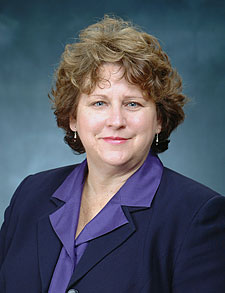UM’s chief research officer receives top NIH honor

Alice Clark, Vice Chancellor
he National Institutes of Health Center for Scientific Review has named Alice M. Clark the 2010 winner of its top honor for extraordinary commitment to peer review.
Clark, vice chancellor for research and sponsored programs and F.A.P. Barnard Distinguished Professor of Pharmacognosy, will receive the Marcy Speer Outstanding Reviewer Award, which highlights the vital contributions of CSR reviewers who evaluate NIH grant applications.
“With her wonderful enthusiasm and passion for rigor and fairness, Alice personifies all that’s great about our reviewers,” said CSR Director Toni Scarpa.
Scarpa noted that Clark was nominated by four CSR officers, three NIH program officers and three fellow reviewers. They called her the “chair of chairs” for her exceptionally “fair, efficient and collegial” way of running meetings.
‘This recognition from NIH acknowledges an amazing contribution to science and the peer-review process.’
UM Chancellor Dan Jones
In an average year, about 16,000 reviewers volunteer some 150,000 days to assess the scientific merit of more than 58,000 grant applications. Their scientific evaluations help NIH invest more than $20 billion in the most promising research grants, paving the path to biomedical breakthroughs that improve public health and save lives.
“This recognition from NIH acknowledges an amazing contribution to science and the peer-review process,” said UM Chancellor Dan Jones. “Only the best scientists are selected to participate in these review panels. That Dr. Clark was chosen to receive this award from among thousands of reviewers is an indication of her national stature in science. We are fortunate to have a person of her ability, commitment and character leading research for our university.
During Clark’s 20 years of service, she has participated in 63 reviews, including those as a regular reviewer and chair for the AIDS and Related Research Study Section and the Drug Discovery and Mechanisms of Antimicrobial Resistance Study Section. She was also a regular member of the Bio-Organic and Natural Products Chemistry Study Section and has served on multiple special emphasis panels.
Clark will receive her award in early 2011 in Bethesda, Md.
“This award calls attention to Dr. Clark’s dedication to timely science and unbiased peer review in the funding process,” said Pharmacy Dean Barbara Wells. “It highlights her dedication to the very best science, fairness to all concerned, improving human health and fiscal responsibility in the funding of research.
“These qualities, and a few others, have enabled Dr. Clark to grow the university’s research programs and to encourage and mentor faculty to realize their potential. Despite demanding administrative responsibilities, she has maintained an impressive funded research program of her own, a truly remarkable achievement.”
The Marcy Speer Award recognizes scientists who demonstrate extraordinary commitment to CSR peer review groups, making it possible for NIH to fund the best applications and, ultimately, improve public health. The award’s namesake exemplified this commitment by continuing to review grants during her treatment for breast cancer and extending her term as a regular member of a genetics review panel to make up for meetings she missed during chemotherapy. She died Aug. 4, 2007.
CSR organizes the peer-review groups that evaluate most grant applications submitted to NIH. These groups include experienced and respected researchers from across the country and abroad. Since 1946, CSR’s mission has been to see that NIH grant applications receive fair, independent, expert and timely reviews—free from inappropriate influences—so NIH can fund the most promising research.
NIH—the nation’s medical research agency—includes 27 institutes and centers and is a component of the U.S. Department of Health and Human Services. It is the primary federal agency for conducting and supporting basic, clinical and translational medical research, and it investigates the causes, treatments and cures for both common and rare diseases.
|

